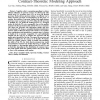Free Online Productivity Tools
i2Speak
i2Symbol
i2OCR
iTex2Img
iWeb2Print
iWeb2Shot
i2Type
iPdf2Split
iPdf2Merge
i2Bopomofo
i2Arabic
i2Style
i2Image
i2PDF
iLatex2Rtf
Sci2ools
JSAC
2011
2011
Spectrum Trading in Cognitive Radio Networks: A Contract-Theoretic Modeling Approach
—Cognitive radio is a promising paradigm to achieve efficient utilization of spectrum resource by allowing the unlicensed users (i.e., secondary users, SUs) to access the licensed spectrum. Market-driven spectrum trading is an efficient way to achieve dynamic spectrum accessing/sharing. In this paper, we consider the problem of spectrum trading with single primary spectrum owner (or primary user, PO) selling his idle spectrum to multiple SUs. We model the trading process as a monopoly market, in which the PO acts as monopolist who sets the qualities and prices for the spectrum he sells, and the SUs act as consumers who choose the spectrum with appropriate quality and price for purchasing. We design a monopolist-dominated quality-price contract, which is offered by the PO and contains a set of qualityprice combinations each intended for a consumer type. A contract is feasible if it is incentive compatible (IC) and individually rational (IR) for each SU to purchase the spectrum with ...
Related Content
| Added | 16 Sep 2011 |
| Updated | 16 Sep 2011 |
| Type | Journal |
| Year | 2011 |
| Where | JSAC |
| Authors | Lin Gao, Xinbing Wang, Youyun Xu, Qian Zhang |
Comments (0)

